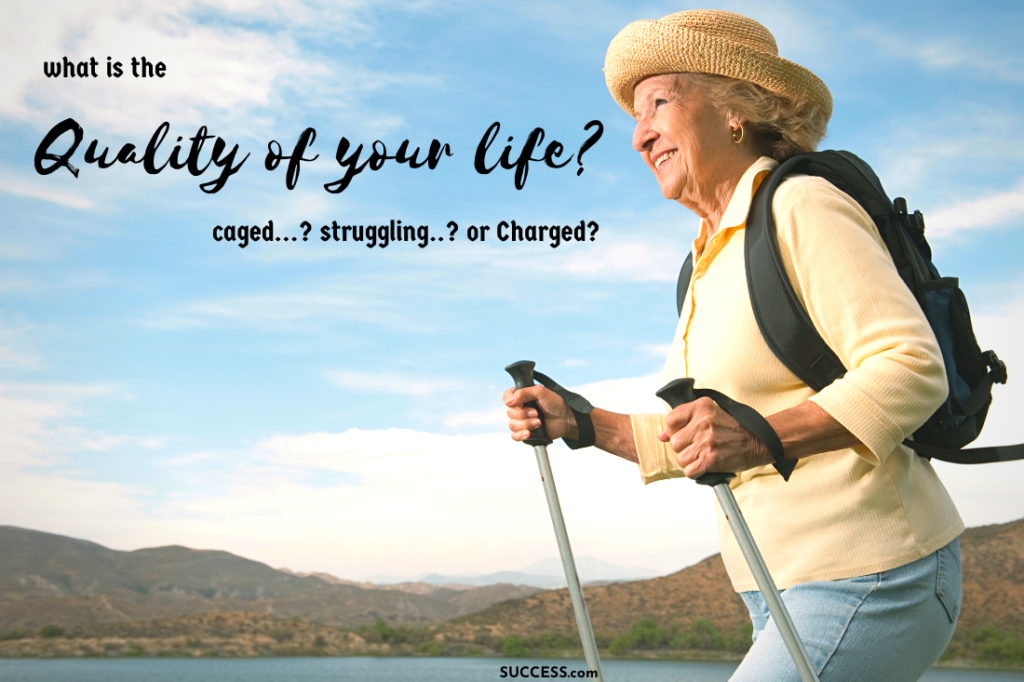I believe there are three kinds of life, and depending where we fall on that spectrum, we’re going to have a different quality of life. On one side of the spectrum—caged—we’re often miserable and suffering, struggling, and upset all of the time. If we’re on the other side—charged—we’re fully engaged, energized and enthusiastic. Knowing where you are on this spectrum can completely change your life because that knowledge empowers you to make a decision about what type of life you want to live.
Related: 31 Things That Happen When You Finally Decide to Live Your Dreams
The Caged Life
In the first type of life, it feels like you’re caged, trapped, either in your past or in your current circumstances. Maybe you’re trapped in other people’s expectations or maybe just in your own personal limitations of belief or behavior. You don’t feel like you can break free. You don’t feel you can have that emotional, time or financial freedom; you truly feel trapped.
Everyone has been there in life when they just don’t feel like they can get out of something or they feel that they’re really struggling. Over time, the caged life has a look, a feel and a sound. If you take a big animal, throw it into the zoo and put it behind bars, that big animal will stalk in frustration, wanting to get out of there. But over time, the animal becomes resigned, moves toward the back of the cage, angry and frustrated. The animal looks out into the world and resigns itself to a life of anger and frustration.
You can tell when a person is there because they have a recurring pattern of resignation and frustration. They look at successful people as “born with it,” or “just lucky.” When they look at the world, they often point in anger and say, They don’t understand me.
They have a belief that others can’t understand them, that they are trapped in something nobody else could understand. But the great tragedy is that their anger separates them from other people. They’re less likely to be the ones who ask for help, yet they’re the ones who need the help.
They’re operating from a place of high ego, which is tough to say to people. They believe they’re so special and that their circumstances are so special—that no one has ever had cancer, no one else has ever lost somebody, gone bankrupt, or could ever understand them—but out of billions of people and thousands of years of history, somebody has been through it before.
This belief makes them less likely to ask for help. The caged life, over time, starts to feel miserable. Only two things can bring about change in that person’s life—something new comes into your life to rattle your cage or break you free. Maybe that cage rattling is pure luck and you win the lottery, or a new person comes into your life and changes your outlook. Maybe a new circumstance or new opportunity alters forever the course of your life and breaks you free.
Related: How Bad Do You Want the Life You Want?
For many, the second thing that changes our lives isn’t something new, but the realization that something new has to come out of us. We have to make a different decision about who we’re going to be and what we’re going after in life. We have to decide how hard we’re going to work and what we demand of ourselves every day. How we limit our lives will be by choice, not by circumstances. And at some point the people who’ve been living a caged life, who’ve watched enough successful people pass them by, have at last the mature impulse to say, I’ve got to take control over the direction of my life. I’ve got to break free from these bars that I’ve set up.
We come to the mature realization that we set our own cages and build our own bars, and that there always was a door but we never made the choice to open it and walk through. When we finally decide to change our life, we’re more likely to go out that door, but we always have to remember when you knock on opportunity’s door, it’s work who answers.
It’s going to take a lot of work to change your life, to break free from the bars and get going again, but that’s the great opportunity. When people finally break through that cage, they get out in the open and have more freedom in their life. That kind of life has a quality, too. It feels incredibly different. That kind of life feels freer. You have more freedom to direct yourself and to do things, and you end up with deeper skills and begin to chase your passions.
As they get on a roll, they start becoming more successful. As they become more successful, the things they think they wanted in their lives enter into their lives. They get the two-car garage, the white picket fence, the house, the kids, the friends and dinner parties, enough to get by on and maybe a little more. Soon the excitement of breaking free and getting into that new kind of life begins to feel more comfortable.
The Comfortable Life
In this life, we feel a sense of satisfaction, a greater sense of confidence about who we are and what life is really about and where we’re going. We feel heightened degrees of competency, knowledge, skills and abilities. We feel that we have our life under control—things are good. But over time, in the comfortable life, something stirs within; maybe not a frustration but something in the sense of restlessness.
Related: 7 Ways to Lead a More Satisfying Life
That restlessness is a feeling or sense that maybe there is something more. People who live a comfortable life also have a communication pattern. They say something on a recurring basis that lets you know they’re in a comfortable life. One day someone asks, “How’s everything going?” Although you have every reason in the world to say life is amazing, you hear yourself saying, “Everything’s fine.” That is the tell of the comfortable life. It’s the tell that there must be something more. There must be another quality, another kind of life, which reveals to us that there is this other thing, and that is…
The Charged Life
The charged life has a different quality and feel to it as well. There’s heightened levels of energy. People are more passionate when they’re living the charged life. Because they are more passionate, they feel more of the charge. It’s not a one-time spark or a once-in-awhile good feeling, but rather an enduring state of passion, happiness and satisfaction. It’s an enduring state that’s not triggered by comfort, but rather by challenge.
When we challenge ourselves to go just a little beyond our current competencies, knowledge, skills and abilities, when we have to push ourselves a little further, that’s when we start to feel charged. So much of what we know in neuroscience of what actually charges our brains and enlivens us we can measure by oxygenation and blood flow to specific parts of the brain and by hormonal releases, whether dopamine, vasopressin, oxytocin or serotonin.
These things happen because we’re highly engaged by something that challenges us.
Mihaly Csikszentmihalyi often talks about the concept of flow, of doing something where we’re so engaged with, and we’re so engaged with it because it’s just a little harder than usual. So you aren’t quite comfortable; you’re just a little outside your comfort zone, not totally or completely overwhelmed, but appropriately challenged to stretch yourself. There is a heightened and sustained level of energy and engagement, as well as enthusiasm, and that’s the magic.
If you want to have a fully charged life, you have to start looking forward to things again.
You have to get excited about tomorrow again.
You have to see your life developing again.
You have to set yourself on a path where you’re progressing every day. You have to know tomorrow will be better than it was today, and that tomorrow you’ll become more of who you know you can become. You have to know that tomorrow—by your choices, disciplines and habits—you’re going to evolve into your highest self.
That is the path of the charged life, the constant engagement of the best within us, pushing ourselves with purpose, progress and hope to become our highest selves. That’s the magic. That’s what life should feel like. That’s what we all deserve. So maybe we should start by challenging ourselves just a little more.
Related: 30 Tips to Take Control of Your Life Now
This was adapted from a post that originally appeared on BrendonBurchard.tumblr.com.











